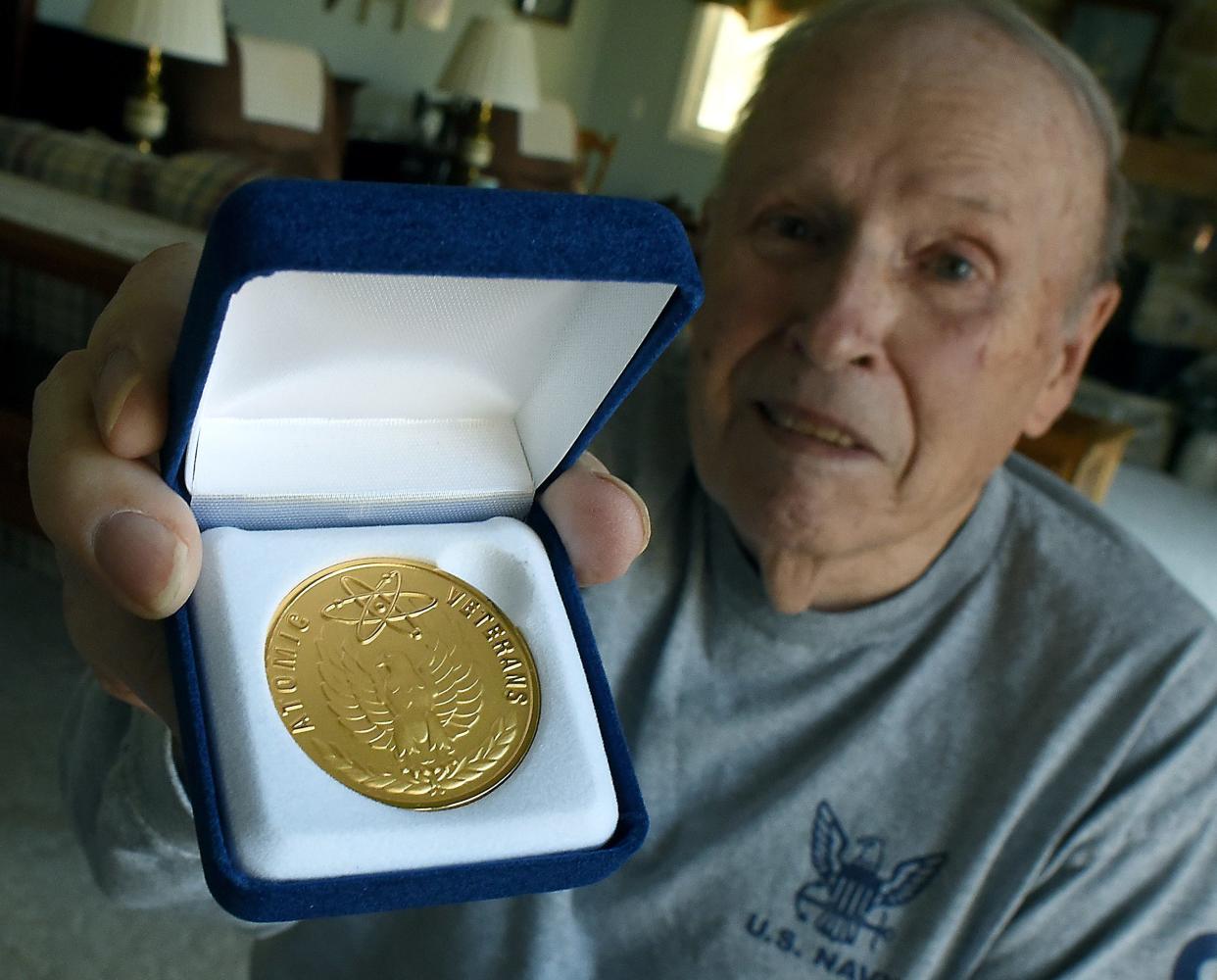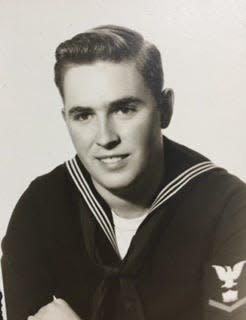Navy veteran from Monroe receives citation for nuclear testing efforts in Vietnam era
MONROE — Tom Hoffman was just recognized for classified missions he completed nearly 70 years ago in the Navy.
Hoffman, 85, of Monroe recently received the Defense Department’s Atomic Veterans Commemorative Service certificate and gold medal for his involvement in testing nuclear weapons. His only other military award was the Good Conduct Medal.
“It was for normal service, nothing like this,” Hoffman said.
The Atomic Veterans Commemorative Service Medal was started in 2022 by the Defense Department to honor veterans exposed to radiation while helping the country develop and test nuclear weapons. Servicemen detonated weapons and cleaned up radioactive material back when the ill effects of radiation weren’t known. According to the Military Officers of America, half a million veterans were involved in the testing. Some, like Hoffman, later developed cancer and other serious illnesses, which may have been caused by radiation exposure.

“The program of the Department of Justice recognizes, after many, many years, those people who served their county and were exposed to radiation,” said Marta, Tom’s wife of 45 years.
Tom, a 1956 graduate of Monroe’s Catholic Central High School, joined the Navy two months after graduation. Because of his background, he was a diver.
“I lived by Detroit Beach. I swam in Lake Erie and was a diver and swimmer, so I ended up with underwater (operations). It was something I could do,” Tom said.
Tom went to mine school in Yorktown, Virginia, and attained the rank of mineman third class. He was assigned to the then-classified Mission Hardtack, which conducted nuclear testing in several locations, including the waters of the Marshall Islands in the northwest Pacific Ocean, where Tom was stationed.
“We planted these mines,” Tom said. “We would do blasts and then go and check on the mines to see what was damaged and what type of damage. We’d see how far it was before there was no damage. We’d see how the mines were impacted. Some of the mines were smashed. In those days, there was no big deal about radiation.”
Early in his Navy service, Tom and fellow diver Philip Dechene were installing mines in the Marshall Islands when they were inadvertently left behind.

“They forgot to pick us up. We were out there in the water for about eight hours. They figured we were gone, but we were still treading water,” said Tom, who estimates the water was about 30 feet deep.
After the Marshall Islands, Tom reported to the carrier the U.S.S. Yorktown, where he again tested nuclear weapons.
“They put me in special weapons,” Tom said.
His work with Operation Hardtack required a secret clearance badge, which Tom still has. The mission was classified until about 20 years ago.
“We were told to tell no one. Everything was top secret. I didn’t say anything to anyone,” Tom said.
Marta only learned about Tom’s work in 2000, at a meeting of the Association of Minemen.
“I didn’t know any of this that Tom did, but it came up at these meetings. I thought he had a gravy job. He was part of secret missions. Wow, I didn’t know any of this,” Marta said.
While several of Tom’s Navy buddies, including Duchene, made the Navy a career, Tom, a father of three, returned home and worked for 34 years for the Monroe County Sheriff’s Office, retiring as a captain. Marta was a registered nurse and later a health care lawyer.
Tom developed cancer while back in Monroe. The Hoffmans aren’t sure if radiation exposure was the cause.
“He never had risk factors for this type. We always wondered,” Marta said.
Subscribe Now: For all the latest local developments, breaking news and high school sports content.
Tom’s cancer required major surgery in 2016, and the surgery led to some health complications. But, today, Tom’s cancer is in remission. Duchene, who died recently, later developed a serious lung condition. It’s also unknown if that condition was caused by radiation exposure.
Tom is now trying to get assistance through the government’s Radiation Exposure Compensation Act.
“The program goes back to the early 1990s. We finally heard about it through Navy groups. We’re waiting for medical records,” Marta said.
“I’m extremely proud of his service,” Marta added. “He did amazing things and got very little recognition for it.”
— Contact reporter Suzanne Nolan Wisler at swisler@monroenews.com.
This article originally appeared on The Monroe News: Tom Hoffman awarded for nuclear testing efforts in Vietnam era
